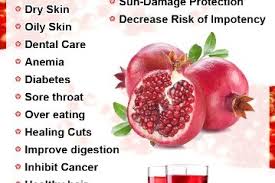Health Benefits Of Pomegranate
Pomegranates is one of the oldest fruits. Pomegranates first grew in ancient Persia and the health benefits of the pomegranate were recognized even then. The Romans gave it its name – “pomegranate” literally means “seed apple” in Latin – and planted the sturdy seedlings throughout their empire. Spain so loved pomegranates that they named the city of Granada after them, according to some historians.

Pomegranates’ deep red color delivers more than just plate appeal; that garnet hue signifies the fruit’s rich supply of antioxidant phytochemicals. Antioxidants counteract cellular damage due to free radicals. While researchers are still studying the effects of antioxidants within the human body and haven’t yet concluded that these compounds work the same in people as they do in a test tube, the National Cancer Society asserts that within the testing they’ve done so far, “antioxidants help prevent the free radical damage that is associated with cancer.”
Health Benefits Of Pomegranates
Lessen Symptoms of Diarrhea
The skin of the fruit and the bark of the pomegranate tree are used as a traditional remedy against diarrhea, and intestinal parasites.
Reduce Cholesterol
Research confirmed because of its antioxidant properties consumption of pomegranate juice for two weeks was shown to reduce systolic blood pressure.
Fight Cell Damage
Pomegranate used to Toning skin, after blending with mustard oil firming-up sagging breasts. It improve complexions, its seeds oil is wildly used in cosmetic products to add moisture, rejuvenate dull or mature skin, assist with wrinkles, calm minor skin irritations, improve skin elasticity and protect the skin.
Nutrient Value
Pomegranate aril juice provides about 16% of an adult’s daily vitamin C requirement per 100 ml serving, and is a great source of vitamin B5, potassium and antioxidant polyphenols.
Pomegranates are high-fiber in some charts of nutritional value. However that fiber is entirely contained in the seeds which also supply unsaturated oils.
Antioxidant
Pomegranates contain three times as many antioxidants as red wine and green tea. In fact, they contain the most antioxidants of any natural food, and especially loaded with Vitamin C and Potassium. Antioxidants are vitamins and enzymes identified for lowering (LDL) or “bad” cholesterol from oxidizing and hardening the arteries.
Lower Risk of Heart Disease
The seeds and juice are considered a tonic for the heart and throat. Research shows that eating organic pomegranate seeds and drinking pomegranate juice can increase oxygen levels to the heart. Organic pomegranate seeds act a lot like aspirin, keeping blood platelets from sticking together and forming dangerous blood clots.
Erectile dysfunction
Studies expose that, over time, organic pomegranates might help combat erectile dysfunction. Researchers report that long-term consumption of pomegranate juice increase and balance the blood flow to the heart and subsequently to the rest of the body. A glass of organic Pomegranate Juice or take one capsule of Pomegranate extract daily as a natural remedy for erectile dysfunction.
Lower Risk of Cancer,
There are also possibilities that pomegranate compounds influence prevention of prostate cancer or slow its growth. In some research pomegranate extract delayed the development of tumors and improved survival.
In addition pomegranate seed oil, fermented juice, and pericarp extract to cause cancer cells to self-destruct. So far the juice and extracts are not toxic to the healthy breast cells. It could be used as a source for cancer prevention.
Nutritional Facts On Pomegranate
Pomegranate Nutrition FactsAmount: 1
Total Weight: 282 g
| Nutrients | Amount |
| Basic Components | |
| Protein | 4.7 g |
| Water | 220 g |
| Ash | 1.5 g |
| Calories | |
| Total Calories | 234 |
| Calories From Carbohydrate | 190 |
| Calories From Fat | 28 |
| Calories From Protein | 16 |
| Carbohydrates | |
| Total Carbohydrates | 53 g |
| Dietary Fiber | 11 g |
| Sugar | 39 g |
| Fats & Fatty Acids | |
| Total Fat | 3.3 g |
| Saturated Fat | 338 mg |
| Monounsaturated Fat | 262 mg |
| Polyunsaturated Fat | 223 mg |
| Omega-6 Fatty Acids | 223 mg |
| Vitamins | |
| Vitamin C | 29 mg |
| Vitamin E | 1.7 mg |
| Vitamin K | 46 mcg |
| Thiamin | 189 mcg |
| Riboflavin | 149 mcg |
| Niacin | 826 mcg |
| Vitamin B6 | 212 mcg |
| Folate | 107 mcg |
| Pantothenic Acid | 1.1 mg |
| Choline | 21.4 mg |
| Minerals | |
| Calcium | 28 mg |
| Iron | 846 mcg |
| Magnesium | 34 mg |
| Phosphorus | 102 mg |
| Potassium | 666 mg |
| Sodium | 8.5 mg |
| Zinc | 0.99 mg |
| Copper | 446 mcg |
| Manganese | 336 mcg |
| Selenium | 1.4 mcg |
